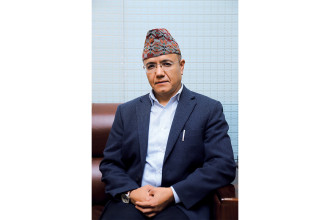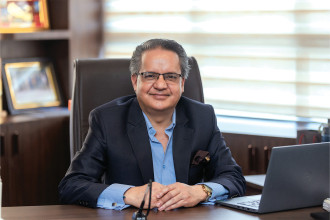
It has been three years since Swastika Shrestha became the Chief Executive Officer of Teach for Nepal (TFN) but her journey with the organisation started from its very roots. Shrestha is the Co-founder of TFN and has been actively involved in nurturing the organisation from its initial phase. She says, “I started off as the Head of Training and Support and the last 10 years have been the best years of my life. It made me realise that my life revolves around service and leadership, qualities I truly believe in.”
In this edition of Business 360, Shrestha shares her thoughts on leadership.

How do you define a leader?
For me, the definition of a leader is very simple. Leaders are the ones who have decided that their life is not just about finding comfort but want to make meaningful changes in others’ life for the betterment of society. When a person leaves their comfort zone and starts doing things for others with the feeling of bringing about change then I think the first steps of being a leader have been taken.Is leadership ‘in-born’ or ‘acquired’?
Personally, I feel this question is somewhat irrelevant in today’s context. We need to step back a little and understand that there are two kinds of people. There are people who want to go ahead in life and think only about their success and prosperity while there are others who think of the prosperity of the larger community. For example, Mahatma Gandhi didn’t have the experience to be a leader but he stood up to injustice and learned along the way. It’s all about learning along the way when situations are thrown your way. Looking back at history, different people have learned how to be leaders in different circumstances and situations and the quality of leadership is seen only when you are in a situation that needs to cater to the people around you and not just yourself. Theoretically speaking, leadership is a skill rather than a trait. Traits can be inborn but the skill to be a leader is acquired from experiences, situations and circumstances.Who comes to your mind as ‘an ideal leader’?
I don’t have an ideal leader. I learn from every person I meet. No one is perfect, so I don’t have one person who I idolise or take as my role model. Martin Luther King Jr is someone I admire for his strength and authenticity. He took it as a mission to bring change for his people. I appreciate him for his will to lead and bring justice to the community and people. Similarly, Anuradha Koirala has the passion to serve every girl like her own daughter. I get inspired by people and don’t want to idolise only one being because there is so much to learn from every individual.Could you share with us any incident that tested your leadership ability?
The biggest test was while starting this movement where you have an ethos idea which sounds very grandiose to a lot of people. The main question that arose was why would young people be involved in TFN when everyone is trying to go abroad for a better lifestyle? There is a stereotype that young people will not be able to achieve their goals and are difficult to trust. The launch of Teach for Nepal was the biggest test to really believe in young people and trust them with the concept and ideas. The biggest challenge was to create a team of believers with the fact that a solution is possible and gather people who believed in it as well. The mentality of change being possible against the popular social tendencies was the biggest barrier we crossed. At the time when I was appointed as CEO, the Covid 19 pandemic began. It was a time of crisis but our team believed that we could still do something and we don’t have to give up. We had to cater to our fellows and children and all of our skills, values and strengths were tested. We had around 135 fellows who were working in different parts of Nepal with around 8,000 students. We had to think of various ways to help them, be it financial or emotional. In the end, we all did our best and came out stronger.
How important is it to have a good team to work with?
Absolutely. A good team is very important. Teach for Nepal is a team of leaders and I am just one among them. I do have some accountability and responsibilities but at the end of the day, you have to lean on your team because their support and encouragement are the most crucial aspects to keep moving forward. During the earthquake, we lost one of our fellows who meant a lot to me and it was like losing a child. It was a difficult situation to cope with. Nevertheless, I remember that everyone in the team was supporting each other and comforting me as well. I felt like I should be the one comforting and supporting them but instead, they were the ones helping me while I grieved and it was one of the biggest lessons I learned – I don’t always have to be at the top helping others; anyone and everyone could be helping and managing. It’s all about leaning on and trusting your team.When do you think a person needs to give up their leadership position?
Being in a high position comes with huge responsibilities. If my actions are hampering the institute then yes, I would definitely leave the position. On the contrary, why should I leave my position? People tend to underestimate how long it takes to build an institution. I am not in a factory making shoes and we are not machines. The skills that I have learned in 10 years cannot be transferred. I personally believe that TFN has become an institution that is trying its best to end education inequality and strengthen public schools and get hundreds of people to lead in their respective communities. It needs time, effort and commitment and it can’t just happen in a short time span.How have your skills contributed to TFN?
I really believe in this work, the importance of the work and the possibility that this will have an impact and change the education sector of Nepal. I have devoted my life to this institution and believe that it will reach its goal gradually. Making small changes and creating an impact are more important as the impact and contribution will definitely resonate in the coming future as well. The skill that I am giving is unfaltering commitment and faith that TFN will live up to its promise.How can a leader prepare for the unknown?
Uncertainty can hit you from any direction, so one needs to be prepared from day one. It takes a lot of time to prepare when in a leading position. You have to fight, mend and learn along the way to prove yourself as well. Classroom education is important but going out in the field and working prepares and shapes you in a manner that book knowledge cannot give. Being resilient and getting over my own insecurities to learn, to find authentic compassion has prepared me for the unknown in various ways. READ ALSO:- ‘Good team is firstly ethical, loyal and learns and grows well together’
- ‘People with authority do not necessarily have leadership qualities’
- ‘A leader is a person born with the potential to become one’
- ‘I believe that to have leadership qualities, one has to have attributes like empathy and sensitivity
Published Date: December 8, 2022, 12:00 am
Post Comment
E-Magazine
RELATED Leadership





-(1)-1752214965.jpg)